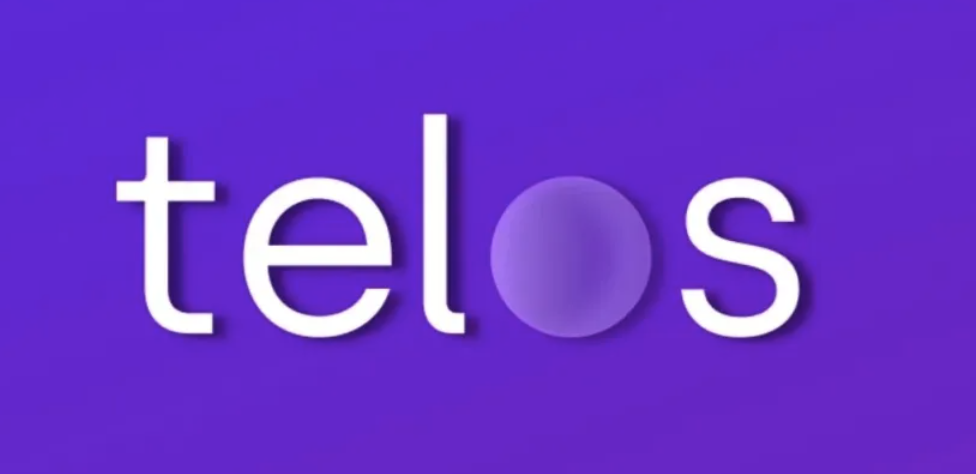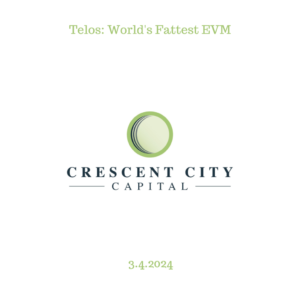Telos: World’s Fattest EVM
By Rayna Ishihara | Crescent City Capital Market Analyst Intern
What is Telos

Telos represents a decentralized computing network and global economy that emerged onto the blockchain scene in December 2018. Its core infrastructure operates on a scalable smart contract blockchain, underpinned by its proprietary cryptocurrency TLOS. A distinguishing feature of Telos is its commitment to facilitating fast and feeless transactions for decentralized applications (dapps), positioning itself as a formidable player in the realm of blockchain innovation. Its Layer-1 EVM compatibility and DPoS consensus mechanism further solidify Telos as a platform designed for efficiency and scalability.
At the heart of Telos lies its robust governance framework, empowering organizations with transparent and collaborative decision-making capabilities. This emphasis on governance is a pivotal aspect of Telos’s mission to foster decentralized economies and promote inclusivity within its ecosystem. By providing stakeholders with the tools to actively participate in shaping the network’s direction, Telos embodies the principles of decentralization and democratization, striving to redefine traditional models of organizational governance.
Furthermore, Telos’s strategic partnerships and integration with AntelopeIO software, alongside its involvement in the Antelope Coalition, underscore its commitment to interoperability and collaboration within the blockchain space. With its impressive throughput of over 15,200 transactions per second (TPS), Telos not only supports the seamless deployment of smart contracts and dapps but also stands as a viable alternative to Ethereum, offering faster and more cost-effective solutions for developers and users alike.
Telos History
Telos, founded by Douglas Horn, Justin Giudici, and Jesse Schulman, began with a commitment to community-driven development outlined in its white paper. Unlike many projects, Telos eschewed traditional fundraising routes, forgoing ICOs and venture capital, relying instead on community support and independent investors.
In 2021, Telos solidified key partnerships with industry leaders such as SushiSwap, Multichain, ConsenSys, CryptoPunks, PancakeSwap, and Uniswap, enhancing its ecosystem’s compatibility and functionality. Notably, the Telos community endorsed the TEDP4 proposal in May 2023, signaling a shift towards a Layer 0 solution, maximizing interoperability and opening new avenues, particularly in Web3 gaming.
With a dedicated team of over 30 core developers, 50 validator teams, and numerous active contributors, Telos has fostered a vibrant ecosystem boasting over 500,000 user accounts. This collaborative effort has seen the development of more than 100 dapps, including notable platforms like Zeptagram for music rights trading, QUDO for gaming, Appics for social media, and Sesacash for payments, reflecting Telos’s commitment to innovation and decentralized solutions.
Telos Token
TLOS serves as the utility token powering the Telos blockchain, rewarding users for staking their TLOS by providing additional tokens for each day staked. Users can stake TLOS for resources like CPU or NET, or lease it to developers for various projects. TLOS is also utilized by projects to pay for user transactions and activity, with initiatives like dStor in early 2021 aiming to drive its use further by competing against storage providers such as IPFS and Amazon.
Telos has introduced liquidity pools like Telos Swaps, enabling instant token swaps with TLOS as the primary asset locked up by projects. This strategy encourages projects to purchase significant amounts of TLOS to list on platforms like tswaps.com. Moreover, Telos is witnessing increased adoption of TLOS as a form of payment by various dapps, including Area X NFT platform, which utilizes Telos’ Marble asset standard for creating and selling digital art and collectibles, along with T-bonds for unique fundraising technology.
T-Bonds represent a creative approach by Telos to support the launch of TLOS on decentralized and centralized exchanges without compromising long-term goals. Combining elements of DeFi and NFTs, T-Bonds feature unique designs and contain a locked amount of TLOS tokens within transferable NFTs. These tokens are unlocked upon reaching maturity date or conditions, providing liquidity for initiatives such as ERC-20 token presales and Uniswap launches.
Telos Tech
Telos stands out in the blockchain space for its innovative technological features, notably utilizing the delegated proof-of-stake (DPoS) consensus algorithm. This approach allows Telos to achieve remarkable transaction speeds, surpassing 15,200 transactions per second (TPS) and 1,826 swap TPS, while maintaining minimal fees. Such efficiency distinguishes Telos from Ethereum, where high gas fees and lengthy transaction times often hinder microtransactions.
The introduction of Telos’ tEVM (Telos Ethereum Virtual Machine) further enhances its compatibility and performance. tEVM enables seamless execution of ERC-20 and ERC-721 smart contracts, written in Solidity, at significantly faster speeds compared to Ethereum. Notably, Telos eliminates the need for altering program code when deploying Solidity smart contracts, ensuring a smooth transition for developers.
An independent audit conducted by Sentnl underscored Telos’ efficiency, highlighting its DPoS consensus algorithm and utilization of EOSIO software. This audit revealed Telos to be thousands of times more efficient than proof-of-work (PoW) blockchains. These technological advancements position Telos as a viable and efficient alternative for developers seeking high-performance blockchain solutions without the drawbacks of traditional systems.
Summary
Telos is a decentralized computing network and global economy powered by its scalable smart contract blockchain and native cryptocurrency TLOS. Launched in December 2018, Telos operates on a Layer-1 EVM-compatible blockchain with a delegated proof-of-stake (DPoS) consensus mechanism. This setup allows Telos to achieve impressive transaction speeds of over 15,200 TPS while maintaining minimal fees, making it suitable for microtransactions and dapp deployments.
One of Telos’ key innovations is its tEVM (Telos Ethereum Virtual Machine), which enables seamless execution of Ethereum-compatible smart contracts, including ERC-20 and ERC-721 tokens, at significantly faster speeds than Ethereum. This compatibility, coupled with Telos’ efficient infrastructure, makes it an attractive option for developers seeking scalable and cost-effective blockchain solutions.
Telos has garnered recognition for its commitment to governance, transparency, and community-driven development. It empowers organizations with governance features and fosters collaboration among stakeholders. Telos has established strategic partnerships with industry leaders and continues to expand its ecosystem with projects spanning various sectors, including finance, gaming, and NFTs.
Recent Updates
The live Telos price on March 3rd is $0.506 USD with a 24-hour trading volume of $2,028,767 USD. It has a circulating supply of 375,573,675 TLOS tokens.
The price of Telos has increased by 7.06% in the past 7 days, and increased by 153.23% in the past months. TLOS is 64.4% below the all time high of $1.43.
Market Analysis
Telos boasts several unique features. Firstly, it prioritizes fairness and compliance by adhering to a first in, first out processing method, aligning with the requirements of major global exchanges like NASDAQ and NYSE. This ensures equitable transaction processing and mitigates front running risks, enhancing market integrity.
Advanced governance is another standout feature of Telos, offering on-chain amendment voting and foundation elections. This empowers stakeholders to actively participate in network governance and decision-making processes, fostering transparency and community engagement.
Telos also prioritizes regulatory clarity by launching without an ICO, thereby ensuring a fair start and minimizing regulatory risks. This approach underscores Telos’s commitment to compliance and legitimacy within the blockchain space.
Furthermore, Telos leverages Layer Zero technology for enhanced security, providing a secure bridge for seamless interoperability between different blockchain networks. This reinforces Telos’s resilience against potential security threats and ensures the integrity of transactions.
In terms of affordability, Telos stands out with transaction fees starting at less than $0.01, making it a cost-effective option for users and developers alike. Lastly, Telos boasts an exceptional track record of reliability, maintaining 100% uptime over five years, highlighting its robust infrastructure and stability as a blockchain network.
It is noteworthy that the price of Telos has surged by 153.23% in the past month, a remarkable feat even within the volatile crypto market.
Last month, SubQuery’s announcement of full support for the Telos blockchain marked a significant milestone in blockchain technology. This integration introduces lightning-fast data indexing capabilities to Telos, potentially revolutionizing blockchain development. By equipping developers with efficient tools for on-chain data processing, SubQuery’s support has the potential to expedite development cycles and facilitate the onboarding of new users into the Telos ecosystem.
Telos, renowned for its Telos Ethereum Virtual Machine (tEVM), is distinguished by its exceptional speed and capabilities within the blockchain domain. With the ability to process over 15,200 transactions per second and boasting 0.5-second block production, tEVM stands out as one of the fastest EVMs available. SubQuery’s founder and CEO, Sam Zou, aims to merge Telos’s robust infrastructure with exceptional indexing capabilities. The collaboration between SubQuery and Telos holds promise for revolutionizing blockchain development.
As evidenced by the chart, Telos experienced its peak performance from late 2021 to early 2022. Subsequently, its price remained subdued throughout 2022 and 2023. The recent surge in Telos’s price is likely attributable to broader trends within the crypto market. Cryptocurrencies soared in 2021, reaching a record high of $69,000 in November of that year. However, following this peak, the overall crypto market experienced a significant downturn, with values plummeting. Throughout 2022, the prices of many crypto coins, including Bitcoin and Ethereum, declined by approximately 75%. Telos’s price trajectory closely mirrored that of the broader crypto market, maintaining stability during this period. This phenomenon has led to the perception that Telos is a slow mover within the market.
Now, with the resurgence of the crypto market, characterized by increased strength and the emergence of new cryptocurrencies, Telos has regained momentum. Coupled with its intrinsic advantages and the overall bullish sentiment in the market, Telos exhibits strong potential for further growth. As the price begins to trend upwards, now presents an opportune entry point for investors.
References
https://coinmarketcap.com/currencies/telos/
https://www.tradingview.com/symbols/TLOSUSDT/
https://dappradar.com/blog/what-is-telos-a-simple-explanation
https://tangem.com/en/blog/post/what-is-telos/
https://coinmarketcap.com/community/articles/65c0e24188a017764dfc02b9/

